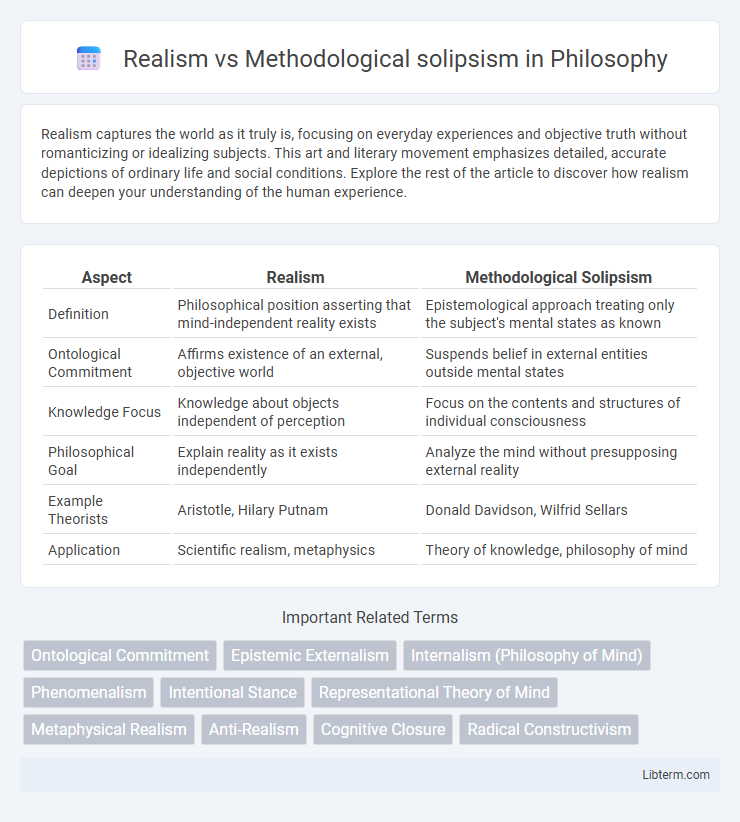Realism captures the world as it truly is, focusing on everyday experiences and objective truth without romanticizing or idealizing subjects. This art and literary movement emphasizes detailed, accurate depictions of ordinary life and social conditions. Explore the rest of the article to discover how realism can deepen your understanding of the human experience.
Table of Comparison
| Aspect | Realism | Methodological Solipsism |
|---|---|---|
| Definition | Philosophical position asserting that mind-independent reality exists | Epistemological approach treating only the subject's mental states as known |
| Ontological Commitment | Affirms existence of an external, objective world | Suspends belief in external entities outside mental states |
| Knowledge Focus | Knowledge about objects independent of perception | Focus on the contents and structures of individual consciousness |
| Philosophical Goal | Explain reality as it exists independently | Analyze the mind without presupposing external reality |
| Example Theorists | Aristotle, Hilary Putnam | Donald Davidson, Wilfrid Sellars |
| Application | Scientific realism, metaphysics | Theory of knowledge, philosophy of mind |
Introduction to Realism and Methodological Solipsism
Realism asserts the existence of an objective reality independent of our perceptions, emphasizing that entities and truths persist regardless of human cognition. Methodological solipsism, by contrast, restricts analysis to the contents of an individual's mind, treating mental states as the sole foundation for knowledge without presupposing an external world. These contrasting perspectives shape foundational debates in philosophy of mind and epistemology, influencing approaches to cognition, perception, and the nature of reality.
Defining Realism: Core Principles
Realism asserts the existence of an objective reality independent of individual perception, emphasizing that entities and their properties continue to exist regardless of human awareness. Core principles include the belief in mind-independent truths, the correspondence theory of truth where statements reflect actual states of affairs, and the priority of external reality in explaining phenomena. This contrasts with methodological solipsism, which restricts ontological commitments to contents of individual consciousness, challenging the assumption of an observer-independent world.
Understanding Methodological Solipsism
Methodological solipsism in philosophy emphasizes analyzing mental states and cognitive processes solely through the subject's internal experiences without presupposing the existence of an external world. Unlike realism, which asserts the independent existence of objects and events outside the mind, methodological solipsism limits its scope to the content of consciousness for studying knowledge and perception. This approach aids in isolating cognitive functions, enabling precise models of mental representation and epistemic verification based strictly on subjective phenomena.
Historical Background and Philosophical Roots
Realism, rooted in ancient Greek philosophy with key figures like Aristotle, asserts that an external reality exists independently of human perception, emphasizing the objective nature of the world. Methodological solipsism emerged in the 20th century, notably through the works of philosophers such as Gilbert Harman, and focuses on explaining mental states solely through the individual's internal states without presupposing an external reality. The debate between these perspectives reflects foundational questions about knowledge, existence, and the limits of cognitive science within epistemology and philosophy of mind.
Key Differences Between Realism and Methodological Solipsism
Realism posits that an external reality exists independently of perception, asserting that objects and events have an objective existence regardless of an observer's awareness. Methodological solipsism, in contrast, limits analysis to the contents of an individual's mind, treating external entities as theoretical constructs without presuming their independent existence. The key difference lies in realism's commitment to an objective external world versus methodological solipsism's focus on internal mental states as the sole basis for knowledge and explanation.
Influential Thinkers and Major Works
Realism and Methodological Solipsism have been debated extensively by influential thinkers like Hilary Putnam and Wilfrid Sellars. Putnam's critique of methodological solipsism in works such as "Reason, Truth and History" emphasizes a concept of internal realism, challenging the idea that knowledge is solely constructed from individual minds. Sellars' "Empiricism and the Philosophy of Mind" argues against the solipsistic premise by advocating for a communal framework of understanding, reinforcing the realist stance that external reality is accessible and knowable.
Implications for Epistemology and Metaphysics
Realism asserts the existence of an external reality independent of the mind, grounding epistemology in the possibility of objective knowledge and metaphysics in independent entities. Methodological solipsism, by contrast, confines inquiry to the contents of an individual's mind, emphasizing internal cognitive states and questioning the independent existence of the external world. This divergence impacts epistemology by challenging the criteria for knowledge justification and reshaping metaphysical commitments regarding the nature of existence and reality.
Applications in Science and Cognitive Studies
Realism supports the notion that external reality exists independently of perception, guiding empirical research and experimental validation in science. Methodological solipsism, emphasizing the primacy of internal mental states in cognition, influences cognitive studies by modeling knowledge acquisition based solely on subjective experience. Applications in artificial intelligence leverage methodological solipsism to simulate mental processes, while neuroscience relies on realism to correlate brain activity with external stimuli.
Criticisms and Debates in Contemporary Philosophy
Realism faces criticism for assuming an independent external world which some argue cannot be conclusively proven, leading to debates about the ontological status of objects beyond perception. Methodological solipsism is challenged for its extreme subject-centric approach that allegedly neglects the social and intersubjective dimensions essential for understanding cognition. Contemporary philosophy debates center on whether a synthesis is possible or if methodological solipsism undermines realism's claim to objective knowledge, especially in epistemology and philosophy of mind.
Conclusion: Evaluating Realism vs Methodological Solipsism
Evaluating realism versus methodological solipsism reveals that realism offers a robust framework grounded in the existence of an external world independent of perception, facilitating objective knowledge acquisition. Methodological solipsism, while valuable for emphasizing the role of mental states in cognition, tends to limit explanatory scope by isolating the mind from external reality. Consequently, realism provides a more comprehensive ontology for understanding knowledge and experience while methodological solipsism primarily serves as a heuristic tool in epistemological inquiry.
Realism Infographic

 libterm.com
libterm.com